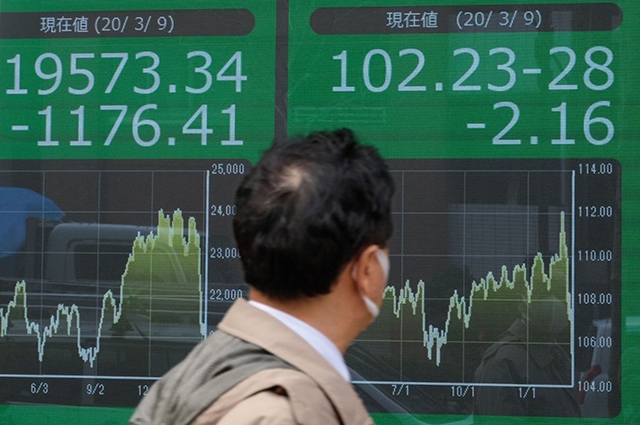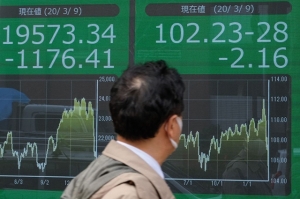Coronavirus Plunges World Markets
Although the coronavirus is showing signs of slowing down its spread in Southeast Asia, where it originated in the December of last year, it is not backing down from hurting the world economy, as the international markets got ready to face a tough week ahead on Monday. Investors are rattled as the coronavirus spread has countries’ economies on the lockdown, and now there’s a clash among the world’s biggest oil producers, Russia and Saudi Arabia.
The recent move of Saudi Arabia in the scrambling price war had the oil prices fall by 30%. This marks the oil market’s biggest one-day plunge since the 1990's Gulf War. While Saudi Arabia and Russia’s competitive war in the oil market is not new, the market has been sensitive ever since the near-shutdown of Chinese markets in January, meaning the two state’s moves are dramatically effective. “While low oil prices can give consumers a boost, they can also disrupt countries that depend heavily on petroleum dollars to keep their economies running,” writes the New York Times.
However, it’s not only the oil markets that are taking a toll: Moody’s Investors Service, a ratings firm, said on Friday that it was expecting a downgrade in growth expectations for the Group of 20 nations.
“The full extent of the economic costs will be unclear for some time. Fear of contagion will dampen consumer and business activity. The longer it takes for households and businesses to resume normal activity, the greater the economic impact,” read the company’s note as published by the New York Times.
Early Monday morning trading showed a decrease in Frankfurt and London exchanges by 8%, and in Paris by 4%. The New York Times further noted that “an index of Europe’s 50 biggest companies was down nearly 6%.”
In China, the Shanghai Composite Index went down by 3.1%. Hong Kong’s Hang Seng Index and South Korea’s Kospi fell 4.2%. However, the biggest plunge was experienced by Australia in the Asia-Pacific region, as the S&P/ASX 200 index dropped a little bit over 7%.
The US market faced its own problems as yields on US government debt fell, and Government bonds signalled that investors treasure the security of a safe harbor now more than ever. As US Market Watch reports, Gold for April delivery US:GCJ20 on Comex rose $20.50, or 1.2%, to $1,688.80 an ounce, after surging 1.5% in the previous session. The New York Times called gold the “tried-and-true indicator of investor skittishness”.
“Futures markets suggested Wall Street would open nearly 5% lower. In bonds, yields on the closely watched US Treasury bond fell below 0.5%, about half the level of just a week ago,” the New York Times wrote of the American market.
In Japan, the Nikkei 225 index fell more than 5%. Japan was already experiencing a shrink in its economy: as the country’s government said on Monday, Japan’s economic performance at the end of last year was worse than initially thought. Then the coronavirus outbreak in the country put its economy more at risk. The New York Times reported that Japan’s economy “had shrunk at an annualized rate of 7.1% in the three months that ended in December, revised down from an initial estimate of 6.3% last month.” Now that the coronavirus has added more pressure on businesses, as Japan is battling with the virus, could mean the economy will continue to shrink in the first quarter of 2020. This is most likely pushing the country into recession, which is generally defined as two straight quarterly contractions.
The French and Italian governments share the fear for the health of their country’s citizens due to the coronavirus, and the fear of what the virus is doing to the states’ economies.
Bruno Le Maire, the French Finance Minister, said the coronavirus could cut French economic growth below 1% in 2020 from a previous estimate of 1.3%.
France’s finance minister is calling for a big European economic stimulus package, and the Italian government has urged the EU to adopt a package of measures to deal with the impact the Covid-2019 is heaving on the international economy.
By Nini Dakhundaridze
Sources: The New York Times, Al Jazeera











